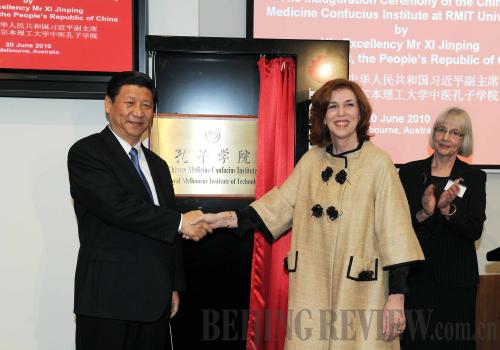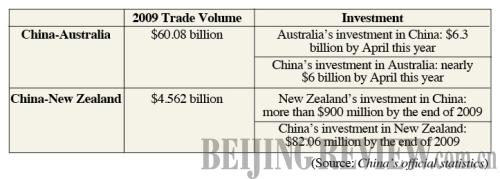|
 |
|
NEW INITIATIVE: Chinese Vice President Xi Jinping inaugurates Australia's first Chinese Medicine Confucius Institute at the Royal Melbourne Institute of Technology (RMIT) in Melbourne on June 20, along with RMIT President Margaret Gardner. The institute aims to promote Chinese language and culture studies, with a focus on traditional Chinese medicine (RAO AIMIN) |
Chinese Vice President Xi Jinping called for strengthened economic, political and cultural ties with Bangladesh, Laos, New Zealand and Australia during his visits to these countries from June 14-24.
In a speech at a trade forum in Canberra, Xi suggested China and Australia deepen cooperation in energy and resources. The two countries' governments and companies should work together to build "long-term and stable" relations for trade and investment in these fields.
Australia is the biggest exporter of iron ore, alumina, coal and liquefied natural gas to China. China, for its part, is Australia's biggest trade partner and biggest export market as well as its biggest source of imports, providing the South Pacific nation with a wide range of products including textiles, home appliances, furniture and toys.
Trade between China and Australia jumped to $60.08 billion in 2009 from more than $10 billion in 2002, registering an average annual increase of more than 28 percent, say China's official statistics. Despite the impact of the global financial crisis, Australia's exports to China soared 31 percent in 2009 over the previous year.
Mutual investment has become an emerging area of economic cooperation between the two countries, Xi said. Australia's investment in China totaled $6.3 billion by April this year, while China's direct investment in Australia amounted to nearly $6 billion.
Given the thriving business ties, Xi urged forging ahead with negotiations to create a free trade area as soon as possible. The two countries started talks on a free trade agreement in 2005 after Australia recognized China's full market economy status.
They should also explore new opportunities in environmentally friendly industries such as sewage and garbage treatment, air cleaning and clean energy, Xi said.

While in New Zealand, the Chinese vice president said the countries' bilateral relationship is at its "best time in history," characterized by frequent contacts between the two countries' top leaders and enhanced mutual political trust.
Remarkable progress has been made in trade relations since the signing of the China-New Zealand free trade agreement in October 2008. It was the first free trade agreement between China and a developed country.
With the free trade agreement in place, the two countries have cut tariffs on goods, expanded trade in services and made their investment environment more standardized and transparent. Despite the global economic downturn, two-way trade between China and New Zealand increased 3.6 percent in 2009 over the previous year.
| 